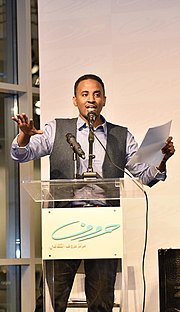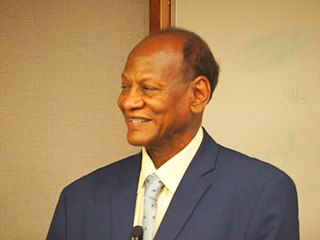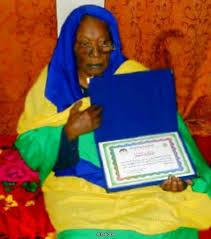 W
WMohamed Abdullah Abdelbari is a Sudanese poet and writer. His poems are inspired from several sources including Sufism and Islamic philosophy. He has won multiple poetry awards and honors across the Arab world such as The African Arab Youth Award (2016) and Sharjah Award for Arab Creativity (2013).
 W
WBushra Elfadil is a Sudanese writer and poet.
 W
WSafia Elhillo is a Sudanese-American poet known for her written and spoken poetry. Elhillo received a BA from the Gallatin School at New York University and an MFA in poetry from The New School. Elhillo has performed all around the world. She has won acclaim for her work and has been the recipient of several prestigious poetry awards. Elhillo has shared the stage with notable poets such as Sonia Sanchez and has taught at Split This Rock. Currently, she is a Wallace Stegner Fellow at Stanford University.
 W
WHawa al-Tagtaga was a Sudanese singer, composer and activist, who campaigned against British colonial rule.
 W
WIbrahim 'Ali Salman is the most famous contemporary poet of the Arab Manasir who inhabit the area of the Fourth Cataract of the Nile in Northern Sudan. He is referred to by the Manasir simply as "Ibrahim the poet".
Abdel Karim al Kabli, sometimes spelled el Kably or al Kably, is a Sudanese singer, poet, composer, songwriter and humanitarian known for his songs with themes of love, passion, nationalism, Sudanese culture and folklore.
 W
WMuhammad Ahmad Mahgoub was both Foreign Minister and then the 6th Prime Minister of Sudan. He was also an important literary writer who published several volumes of poetry and literary criticism in Arabic.
 W
WEmtithal "Emi" Mahmoud is a Sudanese-American poet and activist, who won the 2015 Individual World Poetry Slam championship. In 2018, she became UNHCR Goodwill Ambassador, and in this capacity, has traveled to refugee camps in Kenya, Greece and Jordan, drawing wider attention to the situation of refugees.
 W
WMahjoub Sharif, born as Mahjoub Muhammad Sharif Muhammad, was a Sudanese poet, teacher and activist. He became known in Sudan and other Arabic-speaking countries for his colloquial poetry and his public engagement, both committed to further the causes of democracy, freedom, general well-being and national identity. His poetry was put to music by eminent musicians, such as Mohammed Wardi and Mohamed Mounir, but also led to repeated political imprisonment under different Sudanese governments.